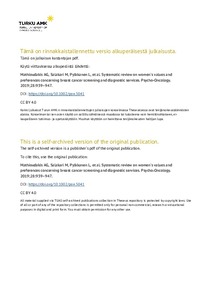Systematic review on women's values and preferences concerning breast cancer screening and diagnostic services
Mathioudakis, Alexander G.; Salakari, Minna; Pylkkanen, Liisa; Saz‐Parkinson, Zuleika; Bramesfeld, Anke; Deandrea, Silvia; Lerda, Donata; Neamtiu, Luciana; Pardo‐Hernandez, Hector; Solà, Ivan; Alonso‐Coello, Pablo (2019)
Mathioudakis, Alexander G.
Salakari, Minna
Pylkkanen, Liisa
Saz‐Parkinson, Zuleika
Bramesfeld, Anke
Deandrea, Silvia
Lerda, Donata
Neamtiu, Luciana
Pardo‐Hernandez, Hector
Solà, Ivan
Alonso‐Coello, Pablo
Wiley
2019
Julkaisun pysyvä osoite on
https://urn.fi/URN:NBN:fi-fe202001293827
https://urn.fi/URN:NBN:fi-fe202001293827
Tiivistelmä
Background: There is still lack of consensus on the benefit‐harm balance of breast cancer screening. In this scenario, women's values and preferences are crucial for developing health‐related recommendations. In the context of the European Commission Initiative on Breast Cancer, we conducted a systematic review to inform the
European Breast Guidelines.
Methods: We searched Medline and included primary studies assessing women's values and preferences regarding breast cancer screening and diagnosis decision making. We used a thematic approach to synthesise relevant data. The quality of evidence was determined with GRADE, including GRADE CERQual for qualitative research.
Results: We included 22 individual studies. Women were willing to accept the psychological and physical burden of breast cancer screening and a significant risk of overdiagnosis and false‐positive mammography findings, in return for the benefit of earlier diagnosis. The anxiety engendered by the delay in getting results of diagnostic tests was highlighted as a significant burden, emphasising the need for rapid and efficient screening services, and clear and efficient communication. The confidence in the findings was low to moderate for screening and moderate for diagnosis, predominantly because of methodological limitations, lack of adequate understanding of the outcomes by participants, and indirectness.
Conclusions: Women value more the possibility of an earlier diagnosis over the risks of a false‐positive result or overdiagnosis. Concerns remain that women may not understand the concept of overdiagnosis. Women highly value time efficient screening processes and rapid result delivery and will accept some discomfort for the
peace of mind screening may provide.
European Breast Guidelines.
Methods: We searched Medline and included primary studies assessing women's values and preferences regarding breast cancer screening and diagnosis decision making. We used a thematic approach to synthesise relevant data. The quality of evidence was determined with GRADE, including GRADE CERQual for qualitative research.
Results: We included 22 individual studies. Women were willing to accept the psychological and physical burden of breast cancer screening and a significant risk of overdiagnosis and false‐positive mammography findings, in return for the benefit of earlier diagnosis. The anxiety engendered by the delay in getting results of diagnostic tests was highlighted as a significant burden, emphasising the need for rapid and efficient screening services, and clear and efficient communication. The confidence in the findings was low to moderate for screening and moderate for diagnosis, predominantly because of methodological limitations, lack of adequate understanding of the outcomes by participants, and indirectness.
Conclusions: Women value more the possibility of an earlier diagnosis over the risks of a false‐positive result or overdiagnosis. Concerns remain that women may not understand the concept of overdiagnosis. Women highly value time efficient screening processes and rapid result delivery and will accept some discomfort for the
peace of mind screening may provide.
